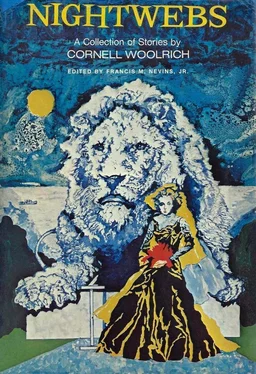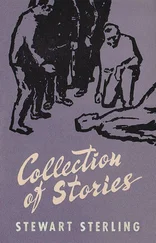If both the preternatural powers above us and the socioeconomic forces of the Depression have us as their target, so too do the police. Individual policemen and the police system as such appear in dozens of Woolrich’s stories, sometimes as the central motif, at other times peripherally. The overall impression Woolrich creates is of a human power just as brutal and malignant as the dark powers above, indeed their earthly counterpart. The characteristic means of evoking this impression is by portraying incredible police brutality and its casual acceptance as completely natural by everyone, including the victims. In “The Body Upstairs” (Dime Detective, 4/1/35) a woman is murdered and the police stick lighted cigarettes into her husband’s armpits until, though innocent, he is on the brink of confessing — at which point the homicide dick who is the protagonist chews out the husband for being a weakling who can’t take it! In “Graves for the Living” ( Dime Mystery , 6/37) the police, purely on the basis of an incredible (though, as it turns out, true) story told them by a complete stranger, take one of their own people into an all-night drugstore, kick the proprietor out, and pour acid on the cop until he confirms the story. “Murder at the Automat,” “Dead on Her Feet,” and the unbearably terrifying “Three Kills for One” all deal in one way or another with police brutality; and the nature of the system as a whole is the central concern of “Detective William Brown” ( Detective Fiction Weekly , 9/10/38), which on the surface seems to reflect a Nixonian law-and-order viewpoint but which beneath the surface is one of the most subtly disturbing of Woolrich’s police stories. Brown is a conscienceless opportunist who rises through the ranks by a combination of courage and ruthlessness, as when he shoots at and, by skill mixed with luck, kills a felon fleeing through a crowd of schoolchildren — both the product and the vigorous exponent of the good old American principle that only results count and that the ends justify the means. Those who remain on the story’s surface will conclude that Brown is ultimately revealed as a bad cop, as a traitor to the force; those who go deeper will see that Brown’s philosophy is the philosophy of the system itself. There is a scene where the police “interrogate” a murder suspect that chillingly reflects the views of Brown, “They kicked the chair out from under him again and again, they tortured him by holding glasses of water before his swollen, bleeding lips, then slowly emptying them out on the floor as he strained forward to drink.” Brown himself takes part in the questioning until his “knuckles are all swollen.” At the climax Brown dies a heroic death in a gunfight with a wanted gangster, and his buddy, the dedicated but plodding cop Greeley, decides to suppress his knowledge that Brown’s career had been based on framing an innocent man for murder and then shooting him “while resisting arrest.” So we see how the filth embedded in the system begins to eat into people like Greeley, the system’s best men.
Woolrich never changed his mind about the police. In one of his last stories, “The Clean Fight,” a team of New York City detectives, acting out of reverence for their dying squad commander, tracks down and shoots in cold blood an ex-cop who was very remotely responsible for the death of the commander’s son. The relation between the dying commander and his men is portrayed quite explicitly in terms of racial mysticism and of Hitler’s Fuhrerprinzip. There is nothing that the young, the black, the poor, and the dissenting have learned about the police that Woolrich did not know long ago (except the political function of repression, for Woolrich was apolitical; his concentration was on relationships not power politics).
So this is the world into which we are thrown, and nothing can be done about it, Woolrich says, except to try to create a few tiny islands of love and trust which can perhaps, for a few moments, make us forget what kind of world we live in. All his life Woolrich wanted to love and be loved, just a little love, as a dying man in a desert longs for just a few drops of cool water; but it never worked out for him. That fact probably explains how and why he evoked the power of love, its joys and risks and heartbreaks, so often and with such matchless poignant artistry.
But love is so fragile, so momentary, and there is so little of it. There is a haunting moment in Chapter 2 of Phantom Lady when the morgue men are removing the body of Marcella Henderson.
The bedroom door had opened again. There was awkward, commingled motion in it. Henderson’s eyes dilated, they slowly coursed the short distance from door to arched opening, leading out into the foyer. This time he gained his feet fully, in a spasmodic jolt. “No, not like that! Look what they’re doing! Like a sack of potatoes — And all her lovely hair along the floor — she was so careful of it—!”
Hands riveted to him, holding him there. The outer door closed muffledly. A little sachet came drifting out of the empty bedroom, seeming to whisper: “Remember? Remember when I was your love? Remember?”
This time he sank down suddenly, buried his face within his two gouging, kneading hands. You could hear his breath. The tempo was all shot to pieces. He said to them in helpless surprise, after his hands had dropped again, “I thought guys didn’t cry — and now I just have.”
And in the last chapter of his unfinished novel The Loser (published as an independent short story “The Release”) there is a similar moment when the protagonist — probably an autobiographical figure — speaks to his dead wife: “I just want your voice in my ear. Just want to hear your voice in my ear. Just say my name, just say Cleve, like you used to say Cleve. Just say it once, that’ll be my forever, that’ll be my all-time, my eternity. I don’t want God. This isn’t a triangle. There’s no room for outsiders in my love for you. Just say it one time more. If you can’t say it whole, then say it broken. If you can’t say it full, then say it whispered. Cleve.”
This may not be art as art commonly goes; the lack of discipline, of control, would seem to rule it out of that category. And yet Woolrich’s lack of control over emotions is a crucial element in his work, not only because it intensifies the fragility and momentariness of love but also because it tears away the comfortable belief, evident in some of the greatest works of the human imagination such as Oedipus Rex, that nobility in the face of nothingness is possible. And if Woolrich’s work is not art as commonly understood, there is an art beyond art, whose form is not the novel or story but the scream; and of this art Woolrich is beyond doubt a master.
The process of love’s dying was as central to Woolrich as love itself, and he is at his most powerful when he evokes the slow corrosion of doubt eating away at the fragile foundations of love and trust between persons. We have already seen the corrosion motif in “The Light in the Window” and it recurs in “I Wouldn’t Be in Your Shoes,” “The Red Tide” and its revision “Last Night,” “Two Fellows in a Furnished Room,” “Charlie Won’t Be Home Tonight” and in many other stories. In most of the corrosion stories there is a very close relationship between the two central characters: lovers, husband and wife, father and son, roommates. A murder or similar act is committed, and a slowly but inexorably mounting body of evidence compels or comes within an inch of compelling one of the two to believe that the other is guilty. The suspense stems from the slow unfolding of the damning evidence, the oscillation between trust and doubt, and our own unawareness of the truth. For in some of these stories the suspected person turns out to be innocent and the damning evidence to be the result of wild coincidence or a frame-up; in other stories the suspect is in fact guilty; and in still others neither the people involved nor the reader ever learns what the truth is.
Читать дальше












